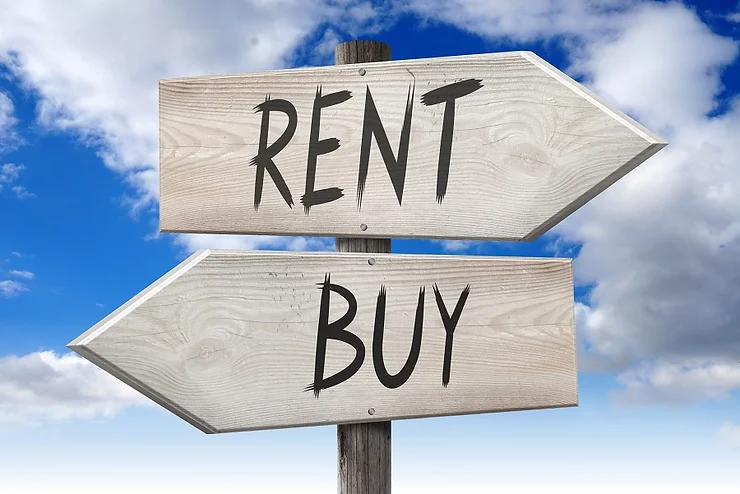The decision to rent or buy a home is a significant one, and it requires careful consideration of various factors. Renting and buying each has their own advantages and disadvantages, and understanding these differences can help you make an informed decision. In this blog post, we will explore the pros and cons of renting and buying a home, highlighting five points for each option. We will also look at several factors that can help you make this decision.
Renting: The Pros – Why it may be good to rent.
Flexibility: One of the primary advantages of renting is the flexibility it offers. Renting allows you to have more mobility, as you can easily move to a new location or downsize without the hassle of selling a property. This is especially beneficial for individuals who frequently relocate for work or prefer the freedom to explore different neighborhoods.
Lower upfront costs: Renting typically requires lower upfront costs compared to buying a home. Instead of a substantial down payment, you usually only need to pay a security deposit and possibly the first month’s rent. This can make renting a more accessible option for those with limited savings or who are not yet ready to commit to a long-term financial investment.
Maintenance and repairs: As a renter, you are generally not responsible for major maintenance and repairs. Landlords or property management companies usually handle these tasks, saving you both time and money. This can be especially advantageous for individuals who prefer to avoid the potential costs and responsibilities associated with property upkeep.
Amenities: Many rental properties offer desirable amenities such as pools, fitness centers, or security services. These amenities are often included in the monthly rent, providing you with convenient access without the additional expenses and maintenance that come with owning such facilities. It can be a cost-effective way to enjoy a comfortable lifestyle.
Opportunity to save: Renting can provide an opportunity to save money. While homeowners have various expenses like property taxes, homeowner’s insurance, and maintenance costs, renters can allocate their savings toward other financial goals or investments. This flexibility can be particularly appealing for individuals focused on short-term financial objectives.
Renting: The Cons – What’s wrong with renting?
No equity or investment: One significant disadvantage of renting is that you do not build equity in a property. The money you pay in rent does not contribute to ownership, and you won’t benefit from potential appreciation in the property’s value. Renting means your housing expenses are essentially a monthly expense rather than a long-term investment.
Limited control: As a tenant, you have limited control over the property. You may be subject to rental agreements, restrictions, and rules set by the landlord or property management company. This lack of control can restrict your ability to make changes or renovations according to your preferences.
Rent increases: Renters are susceptible to rent increases over time, which could make it challenging to budget for housing expenses in the long run. Landlords may raise rent prices due to market conditions or property improvements, potentially affecting your financial stability and forcing you to consider alternative housing options.
No tax benefits: Unlike homeowners, renters do not enjoy the tax advantages associated with homeownership. Homeowners can often deduct mortgage interest and property taxes, reducing their tax liability. Renting means missing out on these potential tax benefits.
Lack of long-term stability: Renting does not provide the same level of long-term stability as homeownership. Landlords may choose not to renew your lease, potentially requiring you to find a new home and disrupting your established routines or social connections. Additionally, you may face the uncertainty of rent fluctuations or even eviction if the property is sold or the landlord decides to change their rental plans.
Buying: The Pros – Why it’s a great idea to buy a home.
Building equity: One of the most significant advantages of buying a home is the opportunity to build equity. With each mortgage payment, a portion goes towards paying down the principal, increasing your ownership stake in the property. Over time, as the property appreciates in value, you can potentially benefit from capital gains when you sell.
Stability and ownership: Homeownership provides a sense of stability and permanence. You have the freedom to make changes and personalize the property to your liking, without the need to seek permission from a landlord. This stability can foster a stronger sense of community and allow you to establish roots in a neighborhood.
Tax benefits: Homeowners may be eligible for several tax deductions that can reduce their tax liability. Mortgage interest deductions, property tax deductions, and certain home-related expenses can result in significant savings during tax season. These tax benefits can contribute to the overall affordability of homeownership.
Investment potential: Real estate has the potential for long-term appreciation, allowing homeowners to build wealth over time. As the property value increases, homeowners can leverage their equity for future investments or as a source of retirement income. Buying a home can be seen as a long-term investment that can yield financial rewards in the future.
Personalization and control: When you own a home, you have the freedom to personalize it to your liking. You can renovate, decorate, and modify the property to suit your preferences and lifestyle. This level of control can provide a sense of fulfillment and make a house truly feel like a home.
Buying: The Cons – Is it a bad idea to buy a house?
Higher upfront costs: Buying a home requires a substantial upfront financial commitment. This includes a down payment, which is typically a percentage of the purchase price, closing costs, and potential ongoing expenses like property taxes and homeowner’s insurance. Saving for these costs can be a significant hurdle for many potential buyers.
Maintenance and responsibilities: As a homeowner, you are responsible for the maintenance, repairs, and upkeep of the property. This includes tasks such as landscaping, appliance repairs, and structural maintenance. These costs can add up and require both financial resources and time to manage effectively.
Limited flexibility: Owning a home can limit your flexibility, especially if you need to move quickly. Selling a property can be a complex process that takes time, and if the market is unfavorable, it could result in a financial loss. Homeowners may face challenges if they need to relocate for job opportunities or personal reasons.
Market risk: The value of real estate can fluctuate, and there is a risk of potential loss if the market experiences a downturn. Homeowners can find themselves in a negative equity position, where the outstanding mortgage balance exceeds the market value of the property. This situation can limit financial options and make it challenging to sell or refinance.
Financial commitment and affordability: Owning a home is a long-term financial commitment. Mortgage payments, property taxes, homeowner’s insurance, and other associated costs can be significant. It is crucial to carefully evaluate your financial situation and ensure that homeownership is affordable and sustainable over the long term.
So how does a person make this difficult decision?
The decision between renting and buying a home is a complex one, and it depends on various factors specific to your circumstances and preferences. Renting offers flexibility, lower upfront costs, and freedom from maintenance responsibilities. On the other hand, buying a home provides an opportunity to build equity, stability, and potential investment returns. However, it also requires a higher upfront investment and carries financial and maintenance responsibilities. Making the decision to buy or rent a home requires careful consideration and evaluation of various factors.
Evaluate your financial situation: Begin by assessing your financial standing. Consider your income, savings, and monthly budget. Determine how much you can comfortably afford for housing expenses, including mortgage payments, property taxes, insurance, maintenance costs, and utilities. Compare this with the rental costs in your desired area to gauge affordability.
Consider your long-term plans: Think about your long-term goals and plans. Are you planning to settle down in one location for an extended period, or do you anticipate job changes or lifestyle shifts that may require flexibility? Assessing your future plans can help determine whether the stability and investment potential of homeownership aligns with your goals or if the flexibility of renting is more suitable.
Analyze the local housing market: Research the local housing market conditions. Examine property prices, trends, and forecasts for the area you are interested in. Understanding the market dynamics can provide insights into whether it is a good time to buy or rent. Consider factors like affordability, rental demand, and potential property appreciation.
Calculate the financial implications: Use online mortgage calculators to estimate the costs of buying a home. Consider factors such as the down payment, closing costs, mortgage interest rates, and potential tax benefits. Compare these costs with the rental expenses you would incur. Look at the long-term financial implications of each option, considering factors like equity building, potential appreciation, and the impact on your overall net worth.
Assess lifestyle preferences and responsibilities: Consider your lifestyle preferences and the responsibilities associated with homeownership. Do you enjoy the freedom to personalize your living space? Are you willing to take on maintenance tasks and associated costs? Assessing the level of control and responsibilities you are comfortable with can guide your decision.
Seek professional advice: Consult with a financial advisor, mortgage broker, or real estate professional to gain insights into your specific situation. They can help you analyze the financial aspects, offer guidance on market conditions, and assist in understanding the long-term implications of your decision.
Weigh the pros and cons: Make a comprehensive list of the pros and cons of buying and renting based on your analysis of financial, lifestyle, and market factors. Consider the advantages and disadvantages of each option and prioritize them based on their relevance to your situation. This exercise will help you visualize the impact of each choice on your life and make an informed decision.
Evaluate your personal priorities: Ultimately, your decision should align with your personal priorities and values. Consider the importance of factors like stability, independence, wealth-building, and lifestyle preferences. Determine which option best supports your long-term vision and personal fulfillment.
Conclusion
Remember, there is no one-size-fits-all answer to the buy vs. rent decision. It is a highly personal choice that depends on your unique circumstances, financial capabilities, family situation, and lifestyle preferences. Only by carefully evaluating the financial aspects, market conditions, and personal considerations, can you make a decision that aligns with your goals and provides a comfortable living situation.







